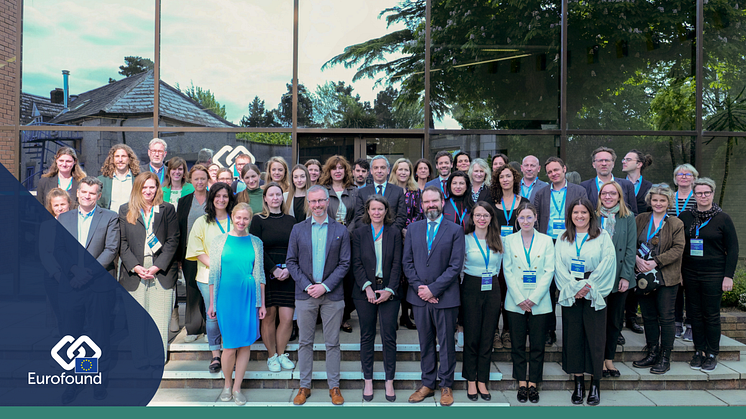
Blog post -
Europe’s year of resilience and resolve
By Ivailo Kalfin
Europe Day is a celebration of unity, solidarity and harmony. While we may not have had much to celebrate this past year, one thing we can be proud of is how Europe has come together in the face of large-scale challenges and threats, showing that solidarity is the key to resilience and resolve.
In February last year, when we all expected to begin the long road of recovery, Russia invaded Ukraine. This war, on the doorstep of the EU, hit economies still fragile from the COVID-19 pandemic on several fronts: soaring prices, particularly relating to energy and food; a need to redeploy resources to defence expenditures; and disrupted supply chains. The EU, in response, continued with the deployment of the NextGenerationEU plan for recovery and resilience, maintained ambitious targets for the digital and green transitions, mobilised to help Ukraine’s government and citizens respond, and moved to help an unprecedented influx of people seeking refuge.
This rapid response, unified action and refusal to be derailed in reaching long-term objectives, reaffirmed the raison d'être of the EU. The provision of investments at a favourable cost, the maintenance of high employment levels, the economic coordination and the role of the European Central Bank in taming inflation could only be achieved through solidarity and common action.
At this important juncture for Europe, Eurofound continues its vital research in living and working conditions, employment and industrial relations.
The 'Great Reassessment'
The legacy of the COVID-19 pandemic — with its economic insecurity, lockdowns of entire sectors, stress, implicit preoccupation with medical risk, deteriorating mental health situation, surge in remote work and burgeoning advancement of digital technologies — accelerated some major trends in the world of work.
Telework is no longer a necessity but a preference, and often a privilege. The concept of work itself has also evolved, and there is no longer the same expectation to have a workplace for life. Factors such as better work–life balance, autonomy, and working time flexibility increased, along with the flexibility that new digital tools brought.
In this new environment, other problems appeared – increasing gaps in working conditions between different professional occupations, long work hours, high work intensity, increased psychosocial risks, among others. There is also a very visible shift in the preferences and behaviour of workers who quit a job and even a profession to try something new. This transition has been facilitated by high employment levels – in part thanks to EU policies – and the ongoing digital transformation. These labour market movements where workers left strained jobs – which often exacerbated labour shortages in sectors such as transport, hospitality or care – was known as the ‘Great Resignation’. However, research shows that workers did not just quit the labour market entirely, but instead quickly transitioned to new roles, keeping unemployment levels low. Therefore, it is more appropriate to call this phenomenon the ‘Great Reassessment’, as increased labour mobility provided much more freedom and choice for workers.
Assessments on job quality and analyses of job resources, such as job recognition and autonomy, and strains can be found in the European Working Conditions Telephone Survey (EWCTS). It shows very clearly that labour market shortages exist in sectors where jobs are more strained – healthcare, transport, construction and hospitality. To ensure a cohesive labour market, these jobs need to become more resourceful and attractive, and appropriate upskilling and reskilling possibilities need to be available.
Rethinking working time and the workplace
The COVID-19 pandemic revolutionised teleworking. Just 4–5% of workers were teleworking in the EU prior to the pandemic. By 2022, a quarter of workers had some experience of teleworking, and 80% of those wanted telework to remain a feature of their working life. This positive experience, despite the stressful environment, led to major shifts in employment, and an increase of job shortages in certain sectors where telework is not possible.
Full-time telework has now generally been replaced with a hybrid model, with some days in the office/on-site and others teleworking. This working arrangement seeks to ensure a more efficient use of working time as well as better work–life balance. At the same time, this mode unearthed additional challenges related to innovation, creativity, and fostering organisational culture, among others.
The main undercurrents of the telework debate have been efficiency and work–life balance. Unpaid work, such as caring about family members, maintaining a home, shopping and cooking, should be taken into account when considering how workers balance their work and private life. In this regard, working women work a double shift when paid and unpaid work is combined, although men are more likely to spend more time at the office. Europe’s deepening telework divide – between professions and people alike – as well as re-emerging inequalities regarding unpaid work look set to feature on the political landscape for years to come.
Crises and resurgence
Another driver of labour market shifts in 2022 was workers seeking to adapt to high inflation, provoked by the fallout of Russia’s war of aggression against Ukraine. In May 2022, just a few months after the outbreak of the war, Eurofound’s Living, working and COVID-19 e-survey highlighted the struggle to deal with the escalating cost-of-living crisis, with more people reporting an inability to make ends meet and household arrears in 2022 than in 2020. The accumulation of shocks created by the insecurities stemming from the pandemic, war at the borders of the EU, looming geopolitical instability, and rapidly rising inflation was in many respects a perfect storm for citizens. Not surprisingly, subjective well-being and optimism for the future were lower at the outset of the war, even compared to the first months of the COVID-19 pandemic. Risk of depression was even higher among those experiencing financial difficulties.
Despite the cascading crises, Europe demonstrated remarkable resilience. The EU cut its energy dependence from Russia, the economy avoided recession and the leap towards green energy and the digital economy increased competitiveness, all of which has helped keep employment levels high.
Europe has also kept its focus on public policies that protect the most vulnerable. The consecutive European years of youth and skills have demonstrated a dedicated focus on the future. Employment growth has been stronger among women, and of the higher-paying jobs created women have taken the largest share – a sure step toward eliminating the disparity between men and women in higher-paying jobs. In the coming years, workers in low-paid jobs should see the benefits of the EU directive that has laid the legal groundwork for a fair and adequate minimum wage so that all workers can earn a decent living.
The unity of nations in the European Union has not only been crucial for their own citizens, but also to the people of Ukraine and further afield. Challenges remain, and many in our Union are in difficult times, but 2022 proved that solidarity is the ultimate response to adversity and aggression.
Further reading
- Publication: Living and working in Europe - Yearbook 2022
- Publication: Working conditions in the time of COVID-19: Implications for the future
- Article: Solidarity with Ukraine and support for the Ukrainian people is unwavering
- Factsheet: Fifth round of the Living, working and COVID-19 e-survey: Living in a new era of uncertainty






